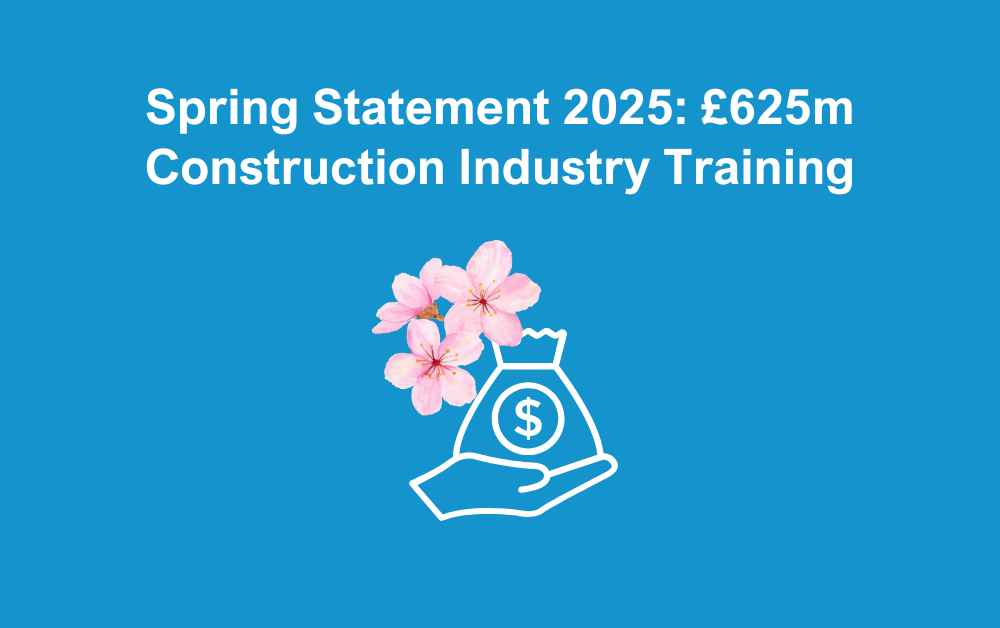Chancellor, Rachel Reeves addressed Parliament yesterday to discuss Government spending plans as part of the Spring statement. Many employers were hoping for a change to the employer national insurance increase, however, original plans sadly remain. This means employer contributions will increase from 13.8% to 15%. Another key takeaway from the statement is that Reeve’s plans to inject £625m into training up to 60,000 construction workers in the UK. In this blog post we will highlight the main updates and how to prepare for them in advance.
£625m Construction Training Investment
As part of the Government’s Spring Statement, a significant £625 million construction skills package was announced to help address the growing demand for skilled labour within the housing sector. This investment forms a crucial part of the Government’s wider ambition to build 1.5 million homes in England during the course of this Parliament.
The funding aims to train up to 60,000 additional construction workers, ensuring the industry has the workforce it needs to meet ambitious housebuilding targets. The investment will be channelled into a range of training and development initiatives. This includes skills bootcamps, construction apprenticeships, and the expansion of Technical Excellence Colleges. These programmes are designed to equip individuals with the practical skills and knowledge required to succeed in a variety of construction roles. It is an attempt to close the skills gap and support long-term economic growth.
By focusing on upskilling and attracting new talent into the sector, this package is expected to play a vital role in unlocking housing development. It is also hoped to support the Government’s commitment to tackling the housing crisis in England.
Tax & Compliance
HMRC has announced plans to significantly strengthen its tax enforcement efforts. They will do this by recruiting an additional 500 compliance officers and 600 staff members for its debt management team. This move supports a broader plan to boost tax collection and cut the £44 billion in unpaid taxes.
In addition to boosting its workforce, HMRC will also expand the scope of the Making Tax Digital (MTD) initiative. From April 2028, the scheme will be extended to cover self-employed individuals and landlords with annual earnings exceeding £20,000. This digital-first approach aims to simplify tax reporting, cut errors, and encourage timely, accurate submissions from more taxpayers.
Defence and Security
The government has committed to increasing defence spending to 2.5% of GDP by April 2027. This marks a significant step in strengthening the UK’s national security and military capabilities. As part of this commitment, the Ministry of Defence will receive additional £2.2 billion in funding for 2025–26 financial year.
Looking ahead, there are plans to raise defence spending further to 3% of GDP during the next Parliament. Although, this will depend on the prevailing economic climate and fiscal capacity at the time.
Key areas of investment include the modernisation and enhancement of the UK’s military capabilities. This is to ensure the Armed Forces are equipped to respond to evolving global threats. In addition, the government will establish UK Defence Innovation (UKDI), a dedicated body aimed at driving forward cutting-edge technological advancements in defence. UKDI will launch in July 2025 with a ringfenced budget of £400 million. This is in hopes to support innovation and collaboration across defence and security sectors.
The Economy
The UK economy is expected to grow steadily over the coming years, with a forecasted growth of 1.0% in 2025, increasing to 1.9% in 2026. These figures represent an upgrade to previous predictions, with stronger growth now expected in every year following 2025.
Inflation is predicted to reach a high of 3.8% in July 2025. However, it is then expected to fall back towards the Bank of England’s 2% target from the middle of 2026. This signals a return to greater price stability for households and businesses.
On public finances, the government is on track to meet its fiscal rules around stability and investment two years earlier. By 2029-30, the government’s day-to-day spending is expected to be in surplus by £9.9 billion.
The Response
The Spring statement has been met with a lot of opinions from businesses and politicians. CEO and founder of HiBob said businesses were keeping a close eye on the announcement in hopes there will be a relief on employer NI contributions. He also pointed out, “With less than two weeks until implementation, employers are now forced to continue making difficult budget decisions, with many reducing hiring, freezing or modifying wages and cutting back on staff investment,”
Paul Johnson, Director of the Institute for Fiscal Studies said: ”Ms Reeves has left herself with the same £9.9 billion sliver of headroom against her target to balance the current budget as she had in October, and a very similar amount of headroom against the target that debt should be falling in 2029–30 (£15.1 billion, down from £15.7 billion in October). All of that adds to uncertainty around policy. We can surely now expect 6 or 7 months of speculation about what taxes might or might not be increased in the autumn. There is a cost, both economic and political, to that uncertainty. The government will suffer the political cost. We will suffer the economic cost.”
In Conclusion
The Spring Statement has delivered a mixed bag for UK businesses. While investment in skills and defence offers some positive steps forward, the lack of change to employer National Insurance contributions is a significant blow for many. With the rate rising from 13.8% to 15%, this places additional pressure on already stretched budgets. At a time when stability is crucial, many employers are now faced with tough decisions around hiring, pay, and investment in their people.
For businesses, this is a worrying and uncertain time. The changes announced – and those still to come – are difficult to navigate alone. If you need support with the upcoming increases next month, we’re here to help. Get in touch with our team today to find out how we can guide you through it.







